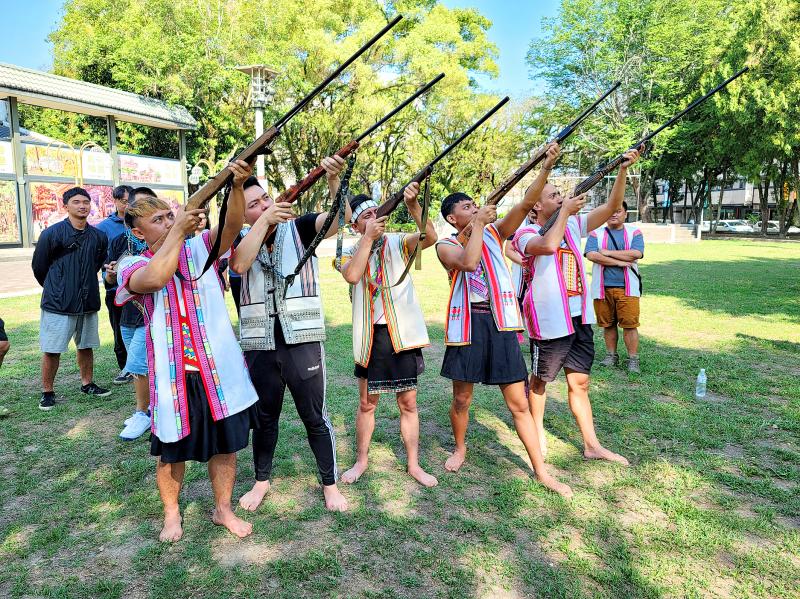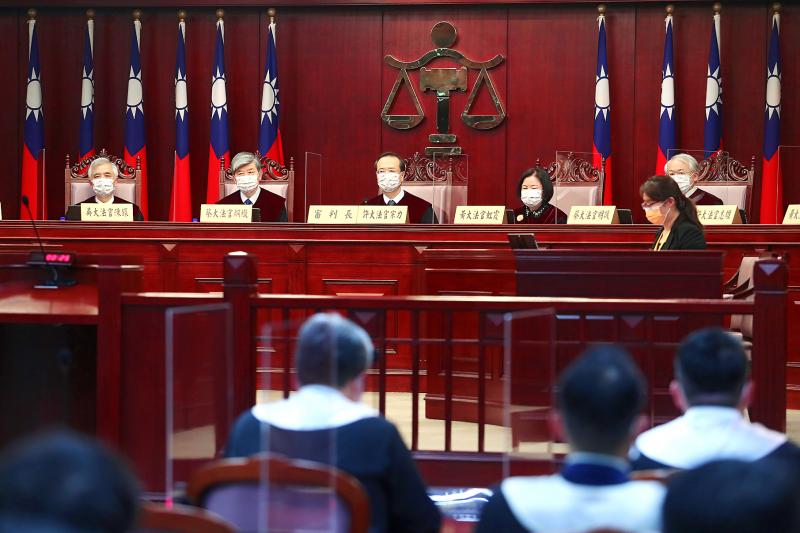The Council of Grand Justices yesterday ruled that some hunting restrictions on Aborigines were unconstitutional, but stopped short of supporting a total overhaul of regulations, which some hunting advocates had called for.
Hunting restrictions have become a contentious issue among Aboriginal communities.
Under current regulations, Aboriginal communities are only allowed to hunt with self-made shotguns during certain festivals and only with prior approval from authorities.

Photo: Tung Chen-kuo, Taipei Times
Advocates say the self-made firearms are dangerous and that restrictions impede on the subsistence hunting traditions their communities have practiced for centuries.
In Constitutional Interpretation No. 803, the grand justices found portions of the Controlling Guns, Ammunition and Knives Act (槍砲彈藥刀械管制條例) and the Wildlife Conservation Act (野生動物保育法) unconstitutional.
Although the Controlling Guns, Ammunition and Knives Act specifies the kind of guns and munitions Aborigines can make, it contravenes the Constitution’s protection of Aborigine’s and their way of life, as the regulations do not consider the safety of those making the guns, the grand justices found.

Photo: CNA
The National Police Agency must amend the act to make it compliant with the Constitution within two years, the council said.
Under the act, Aborigines cannot manufacture, transport or own self-made shotguns or harpoons for making a living without a permit.
The interpretation said that the Constitution protects the traditional cultures of Aboriginal communities, but this protection is predicated on the basis that these are not used for commercial purposes.
However, the Wildlife Conservation Act does not protect Aborigines’ right to hunt protected species, the interpretation said.
A requirement that Aborigines apply to hunt five days in advance, with a ban on unplanned hunting, was unreasonably rigid and unconstitutional, in contravention of the principle of proportionality, it said.
Under the rules, Aborigines must specify the animals they would hunt and how many they would kill in an application, which the interpretation also found unconstitutional.
The ruling followed the 2015 conviction of Tama Talum, a Bunun hunter charged with killing two animals from protected species with a modified shotgun in 2013.
Talum was sentenced to three-and-a-half years in prison, a verdict that caused outrage within Aboriginal communities and sparked a long-running legal battle over the acts.
Talum said he was following tribal customs and was hunting the animals to feed his mother.
The case was in 2017 appealed to the Supreme Court, which upheld the conviction and sentence, but also asked the Council of Grand Justices to review hunting regulations.
Talum called the council’s constitutional interpretation “regrettable” and said he would continue to hunt.
The ruling yesterday does not affect Talum’s case, which is to resume at the Supreme Court.
Hsieh Meng-yu (謝孟羽), a lawyer with the Legal Aid Foundation, said the ruling went “90 percent” against Talum.
However, it was the first time a court has recognized that Aboriginal hunting was “a cultural right that should be respected and protected by the state,” Hsieh said.
The foundation would push for a suspended sentence for Talum, Hsieh added.

In his National Day Rally speech on Sunday, Singaporean Prime Minister Lawrence Wong (黃循財) quoted the Taiwanese song One Small Umbrella (一支小雨傘) to describe his nation’s situation. Wong’s use of such a song shows Singapore’s familiarity with Taiwan’s culture and is a perfect reflection of exchanges between the two nations, Representative to Singapore Tung Chen-yuan (童振源) said yesterday in a post on Facebook. Wong quoted the song, saying: “As the rain gets heavier, I will take care of you, and you,” in Mandarin, using it as a metaphor for Singaporeans coming together to face challenges. Other Singaporean politicians have also used Taiwanese songs

NORTHERN STRIKE: Taiwanese military personnel have been training ‘in strategic and tactical battle operations’ in Michigan, a former US diplomat said More than 500 Taiwanese troops participated in this year’s Northern Strike military exercise held at Lake Michigan by the US, a Pentagon-run news outlet reported yesterday. The Michigan National Guard-sponsored drill involved 7,500 military personnel from 36 nations and territories around the world, the Stars and Stripes said. This year’s edition of Northern Strike, which concluded on Sunday, simulated a war in the Indo-Pacific region in a departure from its traditional European focus, it said. The change indicated a greater shift in the US armed forces’ attention to a potential conflict in Asia, it added. Citing a briefing by a Michigan National Guard senior

CHIPMAKING INVESTMENT: J.W. Kuo told legislators that Department of Investment Review approval would be needed were Washington to seek a TSMC board seat Minister of Economic Affairs J.W. Kuo (郭智輝) yesterday said he received information about a possible US government investment in Taiwan Semiconductor Manufacturing Co (TSMC, 台積電) and an assessment of the possible effect on the firm requires further discussion. If the US were to invest in TSMC, the plan would need to be reviewed by the Department of Investment Review, Kuo told reporters ahead of a hearing of the legislature’s Economics Committee. Kuo’s remarks came after US Secretary of Commerce Howard Lutnick on Tuesday said that the US government is looking into the federal government taking equity stakes in computer chip manufacturers that

CLAMPING DOWN: At the preliminary stage on Jan. 1 next year, only core personnel of the military, the civil service and public schools would be subject to inspections Regular checks are to be conducted from next year to clamp down on military personnel, civil servants and public-school teachers with Chinese citizenship or Chinese household registration, the Mainland Affairs Council (MAC) said yesterday. Article 9-1 of the Act Governing Relations Between the People of the Taiwan Area and the Mainland Area (臺灣地區與大陸地區人民關係條例) stipulates that Taiwanese who obtain Chinese household registration or a Chinese passport would be deprived of their Taiwanese citizenship and lose their right to work in the military, public service or public schools, it said. To identify and prevent the illegal employment of holders of Chinese ID cards or